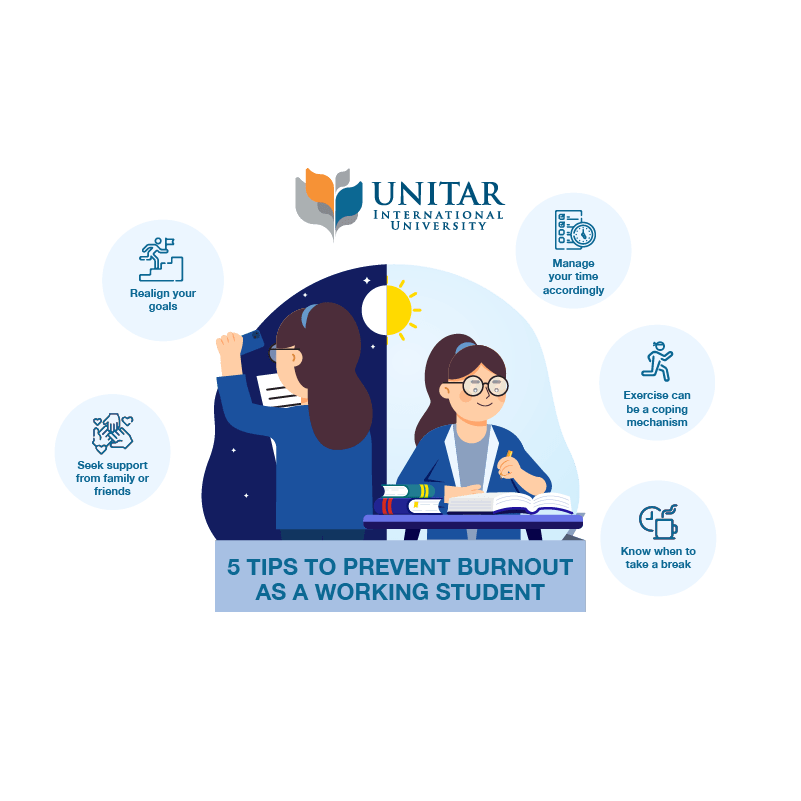5 Tips to Prevent Burnout as a Working Student
- Date: Wednesday, 15 February 2023
- Author: UNITAR

We often hear about job burnout, but did you know that employed students often have much higher levels of academic burnout than work-related burnout? Being a college or university student comes with its own share of trials and tribulations, but life as a working student is a whole different ball game altogether. Not only would you have to juggle job responsibilities with coursework, you would also have to find time to balance your personal life and handle household chores if you happen to be living independently — all of which can, and will likely result in burnout if you’re not careful about pacing yourself.
Academic burnout is a common occurrence among college and university students with symptoms typically showing up in the form of a lack of motivation and interest in studies, impaired focus, lack of creativity, difficulties sticking to regular self-care routines, decreased academic performance and even physical and mental health issues in extreme cases. Some of the reasons why students develop burnout include:
When you’re burning the candle at both ends, it’s easy to slip into a state of burnout where everything seems overwhelming. If you’re wondering how to prevent burnout, whether academic or job-related, here are 5 tips to get you started on bettering your mental wellbeing as a working student:
Setting goals to motivate yourself is important, but the key to successfully achieving them while maintaining a healthy state of mind is to also learn what your limits are and respect the cues your body and mind are giving you. Avoid overcommitting and be more mindful of how much you’re taking on to avoid feeling overwhelmed. Don’t forget to reevaluate your academic and personal goals before setting more realistic ones for yourself.
While being independent is a great trait, it’s also essential to understand that it’s not a weakness to need help or support from family or friends. As human beings who thrive in a community, leaning on your support system when times are tough can help you bounce back faster than if you were to try and tough it out alone.
Effective time management skills can have a huge positive impact on your work, academic and even personal life. With better time management skills, you will be able to get things done, learn how to prioritise tasks and ultimately reduce stress related to time management issues.
Creating a schedule is one of the ways you can organise your time more efficiently. When drafting your schedule, do allocate time for rest as well as taking a breather between tasks can help improve productivity and focus for subsequent tasks.
It may also be helpful to practise the habit of writing a daily or weekly to-do list to help you keep track of tasks and deadlines. Ticking items off your task list may also give you a sense of achievement that will help to boost your motivation levels.
Carving out time to take care of your mental and physical wellbeing shouldn’t be a last minute strategy for when you’re already dealing with burnout. A few ways to deal with this are exercising, eating healthy meals, getting adequate sleep and staying connected to people and activities that can help you de-stress and recharge.
It’s important to know when to push yourself to reach for the stars — but it’s also important to know how and when to take a break. Burnout is a sneaky form of stress and mindfulness is crucial when dealing with it. If you notice changes in your eating habits, mood, focus and health in general, it may be time to take a step back from the hustle for some well-deserved rest.
It’s no easy feat being a working student and at UNITAR, we fully understand and admire the dedication and drive it takes to succeed. With UNITAR International University’s flexible learning degree programmes, studying part–time while working is definitely achievable and it’s no longer necessary to give up an education in pursuit of a career or family. If you’re still considering if you should study full-time or part-time, perhaps checking out our article on the pros and cons of full-time vs part-time study as well as our list of programmes and courses may help you make a more informed decision.
Our education counsellors are ready to help you!
Complete the form below;
it takes less than a minute.
WhatsApp us